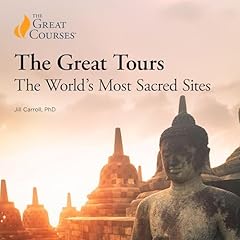
Great Mythologies of the World
No se pudo agregar al carrito
Add to Cart failed.
Error al Agregar a Lista de Deseos.
Error al eliminar de la lista de deseos.
Error al añadir a tu biblioteca
Error al seguir el podcast
Error al dejar de seguir el podcast
 Exclusivo para miembros Prime: ¿Nuevo en Audible? Obtén 2 audiolibros gratis con tu prueba.
Exclusivo para miembros Prime: ¿Nuevo en Audible? Obtén 2 audiolibros gratis con tu prueba.Compra ahora por $30.76
The deep-seated origins and wide-reaching lessons of ancient myths built the foundation for our modern legacies. Explore the mythologies of Europe, the Americas, Asia, Africa, and the Middle East. Learn what makes these stories so important, distinctive, and able to withstand the test of time. Discover how, despite geographical implausibilities, many myths from across the oceans share themes, morals, and archetypes.
PLEASE NOTE: When you purchase this title, the accompanying reference material will be available in your Library section along with the audio.©2015 The Great Courses (P)2015 The Teaching Company, LLCLos oyentes también disfrutaron:




















Las personas que vieron esto también vieron:


















However, I have to point out like many other reviews that the performance in part 2 is bad. The speaker's talk is with a very monotone voice while stuttering and hesitating all the time. The way the lesson is built is also problematic for a better understanding. This decrease the interest of the African myths, which is a bummer.
That being said, the 3 others parts are amazing, and this class should be mandatory to everybody on Audible!
Amazing Course!
Se ha producido un error. Vuelve a intentarlo dentro de unos minutos.
Where does Great Mythologies of the World rank among all the audiobooks you’ve listened to so far?
This is one my my favorites.What did you like best about this story?
I think that I like the African Myths the best because they were so enjoyable to listen to and the professor was dedicated the stories.Any additional comments?
I really like this great course but I had one issue with Professor Kathryn McClymond. She was teaching very well about the Greeks, Romans, etc but she kept mentioning the sexist nature of the ancients. It didn't contribute to the story or the analysis and was very distracting. I didn't mind the first time but she did it multiple times.The other professors were great too and would also mention the racist or sexist natures in the mythology they discussed but she did it like the ancients were insulting her personally.
Still a great listen. Sorry about the rant.
Great Stories and Analysis
Se ha producido un error. Vuelve a intentarlo dentro de unos minutos.
really good
Se ha producido un error. Vuelve a intentarlo dentro de unos minutos.
Some parts good, some long and tedious
Se ha producido un error. Vuelve a intentarlo dentro de unos minutos.
last lecturer is great as well, but needs help pronouncing some things.
first lecturer is amazing. 2nd (African myths) is a diversity hire. 1/5 for him
Se ha producido un error. Vuelve a intentarlo dentro de unos minutos.



